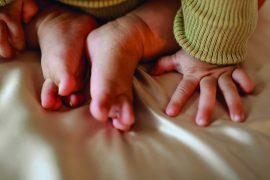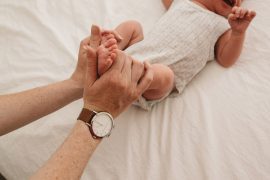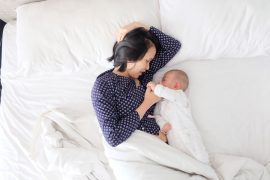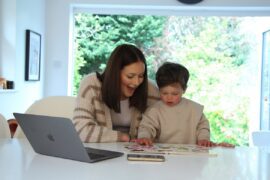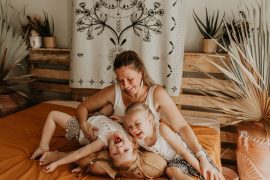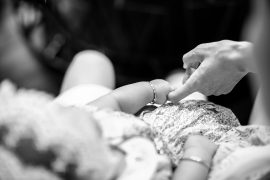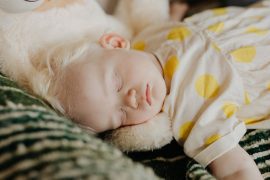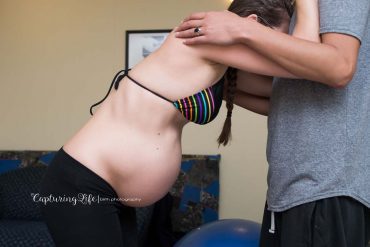The phenomenon of “extinction” sleep training (a holdover from the discredited psychological theory of behaviorism) is another vast social experiment currently being conducted without evidence that it is healthy and safe for babies.
In addition to sleeping alone, Western parents are told that infants should be trained to sleep through the night as early as possible. These methods all involve varying amounts of crying to sleep – something that is not biologically normal for our species.
The phenomenon of “extinction” sleep training (a holdover from the discredited psychological theory of behaviorism) is another vast social experiment currently being conducted without evidence that it is healthy and safe for babies. In fact, one study found a disturbing rise in the stress hormone cortisol in infants “crying it out” (chronically elevated cortisol can harm a baby’s developing brain). Even studies that claim the practice is harmless demonstrate no benefits for either parents or babies – and sleep training does shorten breastfeeding duration (again, a SIDS risk factor).
Of course, sometimes babies cry no matter how responsive we are as parents, but holding and comforting babies seems to mitigate the negative effects of this stress. Studies that have looked at social sleeping with one or more parents have found multiple benefits, including increased breastfeeding (more antibodies and other benefits for baby), more rest for both infants and parents and a stronger emotional bond.
In biologically normal sleep, infant and mother often stir without fully waking – baby latches on and both fall back asleep. The parent’s body helps babies wake frequently during the night so they don’t sleep too deeply and stop breathing.
Advocates of sleep training start with the Western cultural belief that solitary sleep is normal and babies should not disturb their parents at night. Infant night wakings are seen as problematic, rather than protective. Researchers test whether sleep training leads to less crying and fewer awakenings – NOT if this is good for babies.
Again we need to ask – is it healthy and safe for babies to sleep alone? Do parents have to teach their babies to fall asleep? Do parents get more rest if they wean from the breast and sleep train? Does it lead to happier, more independent children? Do sleep trained infants cry less? There is little evidence for any of this and some evidence of the opposite.
There is another way – a way that is normal for our species and has proven benefits, including more sleep for parents and babies. We don’t have to sleep on the ground in the woods, but we do need to avoid hazards associated with our comfortable Western lifestyles. We will look at this in the next What Babies Need.
REFERENCES
Douglas PS, Hill PS. Behavioral sleep interventions in the first six months of life do not improve outcomes for mothers or infants: a systematic review. J Dev Behav Pediatr. 2013 Sept.
McKenna, Ball, and Gettler. Mother-Infant Cosleeping, Breastfeeding and Sudden
Infant Death Syndrome: What Biological Anthropology Has Discovered About Normal Infant Sleep and Pediatric Sleep Medicine. Yearbook of Physical Anthropology, 2007
Middlemiss W, Granger DA, Goldberg WA, Nathans L. Asynchrony of mother-infant hypothalamic-pituitary-adrenal axis activity following extinction of infant crying responses induced during the transition to sleep. Early Human Development. 2012
McKenna & Gettler. Co-Sleeping, Breastfeeding and Sudden Infant Death Syndrome. Encyclopedia on Early Childhood Development. 2010 (online)
Narvaez, D. The Ethics of Early Life Care: The Harms of Sleep Training, Clinical Lactation, 2013
Kendall-Tacket, K.A., Cong, Z., & Hale, T.W. Mother-infant sleep location and nighttime feeding behavior: U.S. data from the Survey of Mothers’ Sleep and Fatigue. Clinical Lactation. 2010
Bartick, M. and Smith, L.J. Speaking Out on Safe Sleep: Evidence-Based Infant Sleep Recommendations. Breastfeeding Medicine. 2014
Whittingham, K. and Douglas, P. Optimizing Parent-Infant Sleep From Birth To 6 Months: A New Paradigm. Infant Ment. Health J., 2014
Middlemiss & Kendall-Tackett, The Science of Mother-Infant Sleep. 2013
McKenna, J. (2007) Sleeping with Your Baby: A Parent’s Guide to Cosleeping.
Pitman, T., Smith, L., West, D., Wiessinger, D. (2014) Sweet Sleep: Nighttime and Naptime Strategies for the Breastfeeding Family. La Leche League International.
Bed-Sharing and Co-Sleeping: Research Overview
News report featuring Dr. McKenna: https://www.youtube.com/watch?v=e3YXRf59TGs
Originally published HERE.
Mary Francell, MA, IBCLC is a licensed lactation consultant in private practice. She and her husband live in Bellingham, Washington, USA and are the parents of three grown children. Mary founded the Biologically Normal Infant Sleep group on Facebook.

